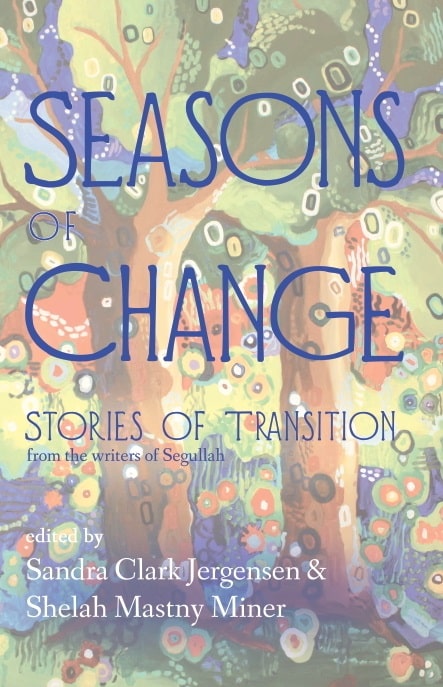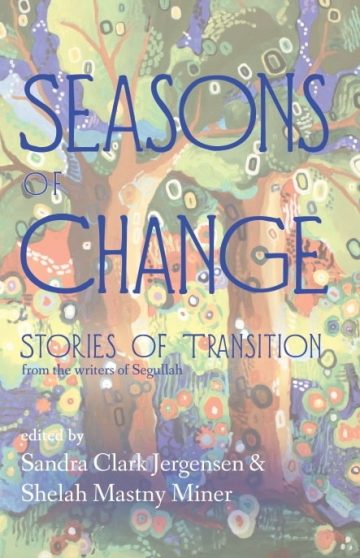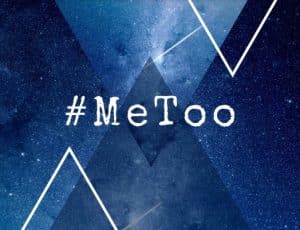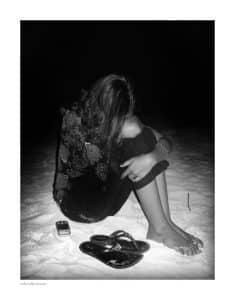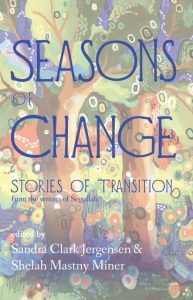 I am not sure what I was expecting when I began reading Seasons of Change. But somehow, having now read it, I feel like I have changed. Become wiser. Become happier. And found something that I didn’t know I was missing in my life.
I am not sure what I was expecting when I began reading Seasons of Change. But somehow, having now read it, I feel like I have changed. Become wiser. Become happier. And found something that I didn’t know I was missing in my life.
The first essay, a piece by Teresa Hirst titled “Three Dollar Attribute” —pricked me. I felt something. It was like an unanticipated, humble, Christmas gift that made me smile because the giver clearly knew me well. I felt loved. “Coming Up For Air,” a poem by Melody Newey was so expressive that I swear I tasted saltwater on my tongue. Each essay or poem that followed had a similar, yet different, profound effect. I wept to myself as I read Catherine Keddington Arveseth’s essay “To Go Home” and made a mental note to remember to offer read it aloud in Relief Society sometime. By the time I came to “When God Baked Pot Pie,” a poem by Terresa Wellborn, I had found my own reader’s rhythm. But this poem made me stop—so I told my husband to listen as I read it to him. But I didn’t make it through—I burst into tears well before the end as I felt my heart connected with God through the words she shared in her poem. Wellborn’s later contribution, “Yá’át’ééh”, rounds this literary pearl into the best collection of Mormon women’s writing that I have experienced in a long time.
The words of these women brought God to me through their words, in humble, rewarding —(sometimes bittersweet) offerings that celebrate women, womanhood, motherhood, sisterhood and friendship in all of its tangles and treasures.
Even the offerings that did not reflect my own life,– or at least not my life exactly, such as “Ebbing Tide” (Melissa Mcquarrie) and “Brownies and Bottled Peaches” (Jessie Christensen)—gently guided me into their lives, where I could sit, read and learn, leaving me with a satisfied spirit that I told myself again and again that I wanted to share with the friends in my life. Being honest, not all of the contributions sung to me. BUT each author spoke in her own voice, sharing a truth that meant something to her—and in a way that fed me a part of her life that I have not (yet?) tasted. So whilst some of the entries did not impact me personally, I know women who will be touched by them, because their story is different to mine. Thus, in complete truth I can say that each essay and poem is remarkable. Each and everyone deserves a shout-out.
I foolishly thought I would choose –perhaps a handful of contributions—to highlight. But nearly each one I read becomes my newest favourite: it’s like choosing your favourite child. You just can’t do it. You might prefer one child to join you in certain activities (my eldest for grocery shopping), and another child for a different event that suits you both best (my youngest to paint nails). But in the end, you love them—perhaps not equally, but completely. Each offering in this book is like that: each will remind you of yourself, or a friend—you will love them completely, and you want to savour the moment of your reading.
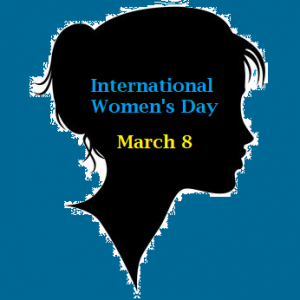 Michelle Lehnardt’s “My Inner Voice” made me want to be a better mother—and call my mother to thank her. Sandra Clark Jergensen’s “Open” made me feel at ease to discuss fertility, infertility, adoption and foster care, and Kellie Purcill’s “Blue Polish” brought a taste of Australia with a feast of vivacious consciousness. At the end of Linda Hoffman Kimball’s Lessons from the Valley of the Shadow, I too cried “Dum vivimus vivamus!” (You’ll have to read the book to appreciate this—no spoilers from me!) And Melody Newey’s “I Tell My Children” spoke the words that haunted me when I was childless, and sustain me now that I have children. Then an added gift, Emily Clyde Curtis’ “Reviving a Doused Testimony” spoke with honesty and truth that enlightened me.
Michelle Lehnardt’s “My Inner Voice” made me want to be a better mother—and call my mother to thank her. Sandra Clark Jergensen’s “Open” made me feel at ease to discuss fertility, infertility, adoption and foster care, and Kellie Purcill’s “Blue Polish” brought a taste of Australia with a feast of vivacious consciousness. At the end of Linda Hoffman Kimball’s Lessons from the Valley of the Shadow, I too cried “Dum vivimus vivamus!” (You’ll have to read the book to appreciate this—no spoilers from me!) And Melody Newey’s “I Tell My Children” spoke the words that haunted me when I was childless, and sustain me now that I have children. Then an added gift, Emily Clyde Curtis’ “Reviving a Doused Testimony” spoke with honesty and truth that enlightened me.
In summary, should you buy this book? Yes. And should you gift this book for International Women’s Day? (Yes) Or to celebrate the anniversary of the Relief Society? (Yes) Or for Mother’s Day? (Yes) Should you have a spare copy on hand when you forget a friend’s birthday? (Yes!) Would it be a great welcome gift to the new woman in your ward? (Yes.) Does it make a great addition and resource for Relief Society lessons? (Yes!)
I highly recommend this book and believe you will as well!
[amazonjs asin=”B075NXDCLS” locale=”US” title=”Seasons of Change: Stories of Transition from the Writers of Segullah”]


